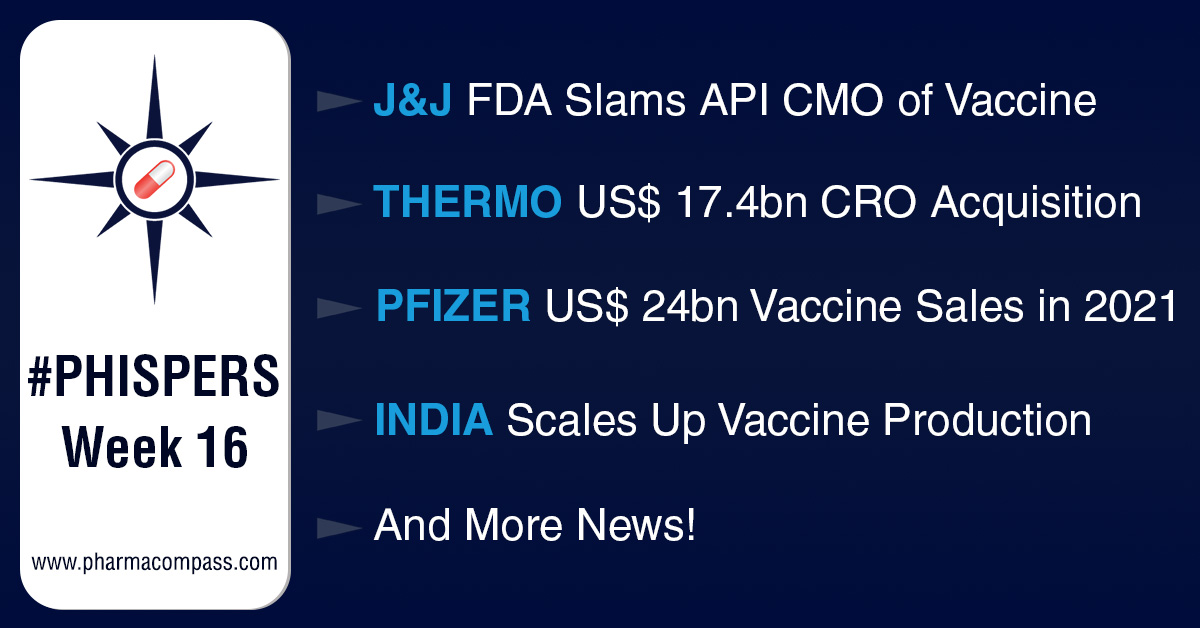
By PharmaCompass
2021-04-22
Impressions: 2043
This week, Phispers brings you an update on Johnson & Johnson’s contract manufacturer Emergent BioSolutions, which recently faced an FDA inspection at its Baltimore plant, following contamination of 15 million doses of the J&J jab last month. In what may turn out to be a serious blow to J&J’s single shot vaccine, the FDA has now issued a Form 483 to Emergent for a litany of unsafe practices that had compromised the quality of the product. Now, Emergent can carry out production only after resolving the quality issues to the FDA’s satisfaction.
We also look at India, which is witnessing a second wave of Covid-19 infections with over 314,000 cases being recorded on Wednesday. The Indian government has opened its vaccination drive to all adults from May 1 and has also set up a market-based system to encourage vaccine makers to increase production.
In the US, Eli Lilly has requested the FDA to cancel the authorization it had granted to its Covid-19 antibody — bamlanivimab. The company now plans to pair bamlanivimab with another drug — etesevimab — to achieve greater efficacy against emerging virus variants.
In Covid vaccine updates, there is news that many European countries will start using Johnson & Johnson’s vaccine in order to speed up their vaccination campaigns. And a Chilean study has found Chinese company Sinovac’s jab to be 67 percent effective in preventing symptomatic infections.
In non-Covid news, Thermo Fisher announced it is acquiring North Carolina-headquartered clinical research organization — PPD Inc — for US$ 17.4 billion.
FDA asks J&J’s contractor Emergent to stop production due to unsafe practices at Baltimore plant
The US Food and Drug Administration (FDA) has issued a closeout report, also known as Form 483, to Johnson & Johnson’s contract manufacturer Emergent BioSolutions after inspecting its Baltimore plant. This plant manufactures APIs for J&J’s one-dose Covid-19 vaccine.
The agency has asked Emergent to stop production until it corrects all the unsafe practices at the plant, which have compromised the quality of products. Due to contamination, 15 million doses of J&J’s vaccine had to be discarded last month.
According to a report published in The Washington Post, the FDA report noted unsanitary conditions and other serious failures at Emergent’s Baltimore plant.
“The 12 pages of findings portray a plant with systemic problems, some of which echo concerns cited in a 2020 inspection report, including poor training of workers,” the news report said.
Emergent BioSolutions has agreed to pause new productions while it works with the FDA to resolve potential quality issues.
There were several violations at the Baltimore plant. The FDA inspectors found that medical waste was improperly handled. Sensitive work areas had peeling paint and black and brown residue on walls. And the security camera footage revealed that workers repeatedly failed to follow procedures to prevent cross-contamination of the vaccines being manufactured there. For instance, shower logs and security camera footage showed employees entering manufacturing areas without following proper showering and gowning procedures.
For the vaccines already manufactured, the product will undergo additional testing to ensure their quality before they are distributed. “We will not allow the release of any product until we feel confident that it meets our expectations for quality,” an FDA statement said.
Earlier, the FDA had instructed Emergent BioSolutions to stop producing vaccine substances for J&J’s shot until officials finish inspecting a plant dogged by production mishaps.
According to an SEC filing released by Emergent this week, the FDA ordered Emergent to stop manufacturing the API for J&J’s vaccine and quarantine existing stock until the agency staff complete an inspection and deliver their findings. Federal inspectors began their assessment on April 12.
Thermo Fisher picks up clinical research organization PPD for US$ 17.4 billion
Last year, Thermo Fisher had announced its plans to acquire molecular diagnostic company Qiagen. However, in August 2020, there was news that the bid had failed. Now, it seems that the company is using the money to focus on clinical research.
Last week, Thermo Fisher Scientific announced it is acquiring North Carolina-headquartered clinical research organization (CRO) PPD Inc, for US$ 17.4 billion.
This acquisition comes close on the heels of another CRO deal that took place in February when PRA Health Sciences got acquired by Dublin-headquartered Icon Plc.
PPD provides a broad range of clinical research and laboratory services to enable customers to accelerate innovation and increase drug development productivity. The CRO operates in nearly 50 countries and generated US$ 4.7 billion in revenues in 2020. “Upon close of the transaction, PPD will become part of Thermo Fisher’s Laboratory Products and Services Segment,” a press statement said.
“The acquisition of PPD is a natural extension for Thermo Fisher and will enable us to provide these customers with important clinical research services and partner with them in new and exciting ways as they move a scientific idea to an approved medicine quickly, reliably and cost effectively,” said Marc N. Casper, chairman, president, and chief executive officer, Thermo Fisher Scientific.
The acquisition is said to enhance Thermo Fisher’s offerings. “The combined company's extensive capabilities and knowledge in serving the pharma and biotech industry will enable new solutions for customers that create the potential to reduce the time and cost of the drug development process,” the statement said. The transaction is expected to be completed by the end of 2021
Vaccine update: Europe to start using J&J jab; Pfizer to clock US$ 24 billion in sales in 2021
European countries are likely to start using Johnson & Johnson’s Covid-19 vaccine soon, and speed up their vaccination campaigns. According to a Reuters report, the European Medicines Agency (EMA) has backed the shot.
Germany will start deliveries to federal states for use in vaccination centers shortly, and France will receive the vaccine from the week after next, the report added. The use of the AstraZeneca and J&J shots had been paused following reports of unusual blood clots. The warning of this rare side effect will now have to be added to the J&J jab’s product information.
Meanwhile, the EMA said that there had been more than 300 cases worldwide of rare blood clotting incidents combined with low platelet counts after the use of Covid-19 vaccines. There were 287 occurrences with the AstraZeneca vaccine, eight with Johnson & Johnson’s shot, 25 for Pfizer and five for Moderna, said Peter Arlett, Head of Data Analytics at the EMA.
According to a tweet by a science journalist, EMA has also put together the numbers of thromboses with thrombocytopenia after Covid-19 vaccines in the European Economic Area. According to this data, the cases were 142 in 16 million in the case of AstraZeneca, 11 in 59 million in the case of Pfizer-BioNTech, and two in 5.2 million in the case of Moderna.
‘Pfizer’s jab to clock US$ 24 billion in sales in 2021’: While the viral vector vaccines are facing setbacks, the messenger RNA vaccines from Pfizer-BioNTech and Moderna are growing from strength to strength. They have proven both safety and efficacy. As a result, Bernstein analyst Ronny Gal has predicted sales of approximately US$ 24 billion for the Pfizer vaccine.
In comparison, the Moderna shot is expected to post revenues of about US$ 14 billion. The difference in their revenues is due to the fact that Pfizer and BioNTech have an extensive manufacturing network, as compared to Moderna, Gal said.
Meanwhile, a report published in The Wall Street Journal said China is planning to authorize the Covid-19 vaccine developed by BioNTech by July. If approved, it will become the first foreign Covid-19 vaccine to be authorized in the country.
‘Sinovac jab 67 percent effective in preventing symptomatic infection’: China’s Covid-19 vaccine made by Sinovac was found to be 67 percent effective in preventing symptomatic infection, as per data from a huge real-world study in Chile.
Sinovac’s CoronaVac vaccine was 85 percent effective in preventing hospitalizations and 80percent effective in preventing deaths, the Chilean government said in a report.
Meanwhile, China’s CanSino Biologics will soon start clinical trials for a Covid-19 vaccine administered through inhalation, the company’s CEO and co-founder Xuefeng Yu said.
Such a vaccine could be more effective than those that are injected given that the coronavirus enters the human body through the airways, Yu said. CanSino Biologics is jointly developing the inhalation vaccine with the Beijing Institute of Biotechnology.
Sputnik V found to be 97.6 percent effective in real-world study: The lead developer of Sputnik V vaccine, Russian scientist Denis Logunov, has stated that the shot has proven to be 97.6 percent effective against Covid-19 in a real-world assessment, based on data from 3.8 million people.
Using a database of people who received both doses of the vaccine, scientists at Moscow’s Gamaleya Institute have calculated a real-world effectiveness rate of 97.6 percent, Logunov said.
The new effectiveness rate is higher than the 91.6 percent rate outlined in results from a large-scale trial of Sputnik V that was published in The Lancet medical journal earlier this year.
Amid rising Covid cases, India goes in for two-tier system to scale up vaccine production
India is facing an unprecedented rise in Covid-19 infections, with over 314,000 new cases and 2,104 deaths being recorded on Wednesday. The Indian government, which is facing growing criticism for improper handling of the second wave of the pandemic, has opened its vaccination drive to everyone over the age of 18 years from May 1 under a market-based system that it claims will encourage vaccine makers to boost production.
At a meeting with Prime Minister Narendra Modi on Tuesday evening, vaccine companies were asked to scale up capacities. They have also been instructed to supply half the doses to state governments for sale in the open market and the other half to the central government under the subsidized price regime.
Manufacturers like the Serum Institute of India (SII), which manufactures AstraZeneca’s jab under the Covishield brand name, have announced the price of the vaccines. SII will be selling the Astra shot to the country’s state governments at US$ 5.30 (INR 400) per dose and to private hospitals at US$ 7.95 (INR 600), as the central government continues to receive the vaccine at US$ 2 (INR 150) per dose.
The company has also urged all corporate and private individuals to access the shots through the state facilitated machinery and private health systems.
According to a report published in The Economic Times, increased production by SII and Bharat Biotech and import of the Russian vaccine Sputnik V will result in a supply of 200 million vaccines in June, compared to 70 million as of today.
Dr Reddy’s Laboratories plans to import 50 million doses of the Sputnik V vaccine by May-end or June. The vaccine will be sold at US$ 9 (INR 675) per dose in India. “We will reach out to multiple channels and collaborate with them — central government, state governments, private sector, healthcare service providers,” Dr Reddy’s spokesperson said.
The supply of Sputnik V is expected to increase after June when the bridging trials conducted by its local contract manufacturers are approved and the drugs regulator inspects their facilities.
Meanwhile, US drug major Johnson & Johnson has submitted an application this week to the Drugs Controller General of India (DCGI) requesting approval to conduct a bridging clinical study of its single-dose vaccine candidate in India.
Lilly requests FDA to cancel authorization granted to its Covid-19 antibody in US
American drugmaker Eli Lilly has requested the US Food and Drug Administration (FDA) to cancel the authorization it granted to its Covid-19 antibody, bamlanivimab. The company now plans to pair bamlanivimab with another drug — etesevimab — to achieve greater efficacy against emerging virus variants.
Eli Lilly said in a statement that the request had been made not due to any new safety issues, but in response to the new variants in the country that could be resistant to bamlanivimab when used alone. The US government stopped the distribution of the therapy last month. The company said hospitals with bamlanivimab supply should now order etesevimab to pair it with.
Earlier this week, Lilly revised its pact with the US government to enable the supply of etesevimab to complement doses of bamlanivimab that the government had already purchased. Lilly has said when used together, etesevimab and bamlanivimab neutralize more emerging Covid-19 variants in the US than bamlanivimab alone, including the rapidly growing B.1.427/B.1.429 California strain.
The drugmaker said it expects to make enough of the cocktail therapy along with partner Amgen to meet global supply needs.
The PharmaCompass Newsletter – Sign Up, Stay Ahead
Feedback, help us to improve. Click here
Image Credit : Phisper Infographic by SCORR MARKETING & PharmaCompass is licensed under CC BY 2.0
“ The article is based on the information available in public and which the author believes to be true. The author is not disseminating any information, which the author believes or knows, is confidential or in conflict with the privacy of any person. The views expressed or information supplied through this article is mere opinion and observation of the author. The author does not intend to defame, insult or, cause loss or damage to anyone, in any manner, through this article.”








